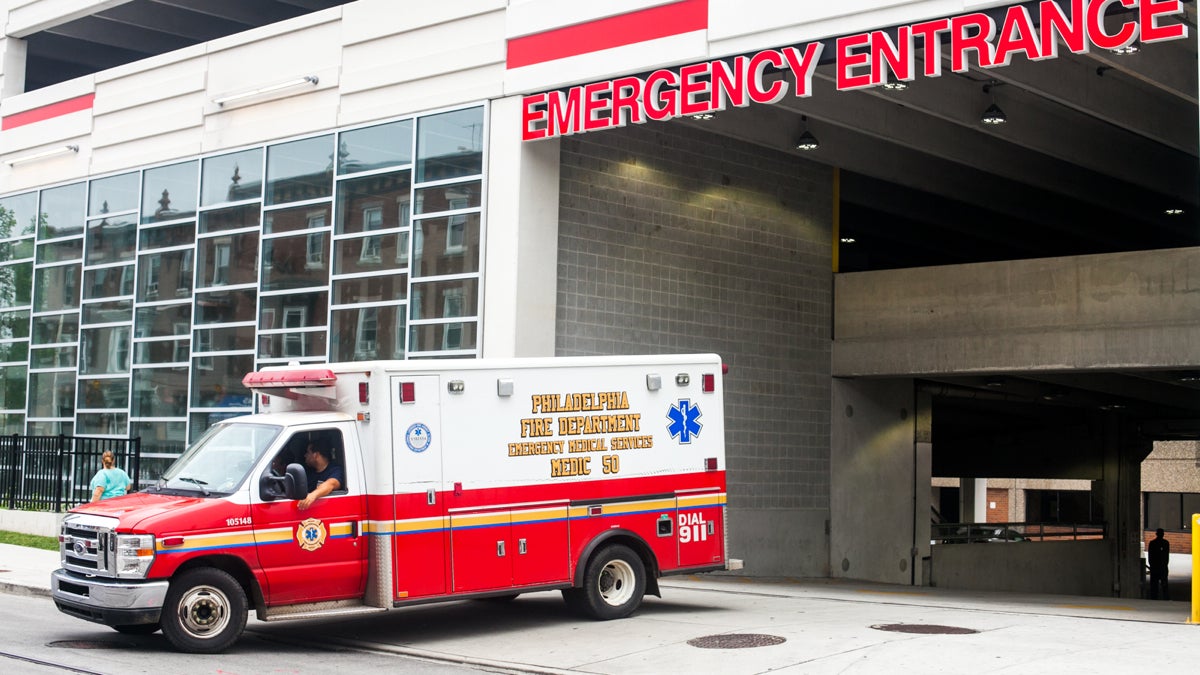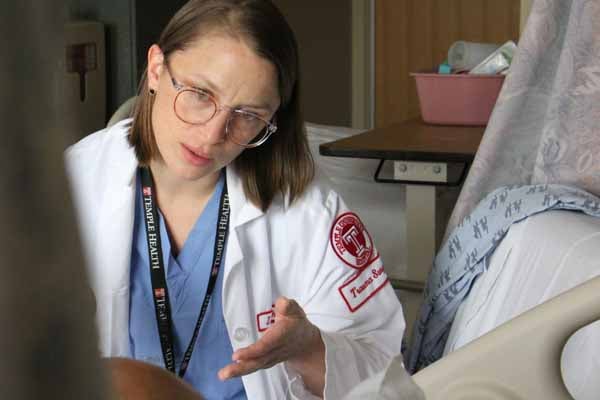Saving more victims of violence or ‘gambling’ with lives?
Listen
An ambulance pulls out of the emergency entrance at Temple University Hospital. (Brad Larrison for WHYY)
Anyone shot or stabbed in Philadelphia will be automatically entered into a high-stakes study that could drastically change the care they receive on their ride to the hospital.
On a hazy May afternoon, Bobby Payne laid motionless on a bed by a wide window overlooking North Philadelphia, a once booming industrial hub that’s been in decline for decades.
The view hasn’t changed for weeks – not since he took a shotgun blast to the stomach and landed at Temple University Hospital.
Payne never saw the bullet coming. He was parked outside of his brother-in-law’s house. He had just grabbed a couple cups of coffee from Dunkin’ Donuts.
“No sooner than I got out of the car, I heard the shot and that’s the last thing I remember, other than laying on the ground,” said Payne.
Payne has a visitor today. Dr. Zoe Maher, a trauma surgeon at Temple, sits in a chair inches away. She’s got a questionnaire in her lap, and she needs Payne to sign off on a counterintuitive study that could save lives, but also put him and his community at risk.

It’s called the Philadelphia Immediate Transport in Penetrating Trauma Trial. It looks at pre-hospital care for patients like Payne – people who have been shot or stabbed and are potentially bleeding to death.
Maher and her colleagues hope to prove that, for these patients, less medical attention is better. That it will increase their chances for survival.
To prove this, patients will be automatically diverted into two groups depending on what dispatch number the city’s system spits out when a call comes to city paramedics for a gunshot or stab wound victim.
Odd numbers will get what’s called advanced care on the way to the hospital. That includes procedures like placing an IV or a breathing tube into the patient.
Even numbers will get basic care and be immediately transported to the hospital.
The study is expected to enroll more than 1,000 patients. Maher insists the study will be stopped if there’s any evidence that it’s harming patients – in either group.
At a recent civic meeting, that wasn’t quite enough to win over every member seated around a long, foldout table set up on the second floor of a recreation center.
“I hear what you’re saying in terms of stopping early if you see that one system is better than the other, but in the interim, you’re still sacrificing people, somebody in order to prove which is better,” said longtime resident Charles Lanier.
Yanitza Gonzalez, who works for a City Councilwoman, nodded from across the room.
“It almost seems like we’ll be gambling with people’s lives,” said Gonzalez.
Dr. Amy Goldberg, another trauma surgeon at Temple, doesn’t see it as a gamble. She said research has already shown that basic care works for these patients.
“And in a city where we see gun violence increasing so much, we really feel compelled to do this study,” said Goldberg.
As of the end of July, Philadelphia had recorded more than 700 shootings.

Maher and Goldberg’s study will only look at IV fluids and breathing tubes. They say both can be problematic for potential enrollees.
Here’s why.
When someone is shot or stabbed and bleeding to death, the body instinctively tries to save itself by constricting blood vessels and forming clots.
For those clots to stick, the body needs your blood pressure to be a bit low.
Maher said IV fluid could raise a patient’s blood pressure and upend all of this. In emergency room parlance, what’s known as emergency room parlance as “Pop the Clot.”
“The risk is that you could raise it so high, you could actually blow open whatever is clotted and actually precipitate bleeding,” said Maher.
Goldberg said CPR – cardiopulmonary resuscitation – is a better option because it keeps more blood moving from the heart to the rest of the body.
“The breathing tube, we’re giving that positive pressure ventilation, decreases the blood that leaves the heart, that can go to the rest of the body and particularly the brain,” said Goldberg.
The study’s sample size is big. Every resident in Philadelphia – all million and a half or so of them – is automatically a potential enrollee.
But the reality is that people from poorer, more violent neighborhoods, like the ones Bobby Payne and Yanitza Gonzalez are from, are more likely to be part the study.
For veteran medical ethicist Arthur Caplan, that brings up a bigger issue.
“You don’t want people saying, ‘well they’re all getting shot and they’re poor and that’s the way it is, so we’ve got to study where the violence is.’ I think there’s some obligation to try and reduce the violence or at least study how to reduce it as much as there is to treat it.” said Caplan, who works for New York University.
You can opt out of the study. You’ll get a wristband, which you’ll wear for the duration of the study, which is expected to last five years, maybe more.
If a patient’s injuries have caused what’s called tension pneumothorax – a dropped lung – that patient will effectively be removed from the study. They’ll get advanced care regardless of whether they had an even or odd dispatch number.
Also, anyone who is under the age of 18, pregnant or a prisoner will be excluded.
On average, about 30 percent of patients who would qualify for this study, die from their injuries. If basic care becomes the norm for paramedics in Philadelphia, Maher says the rate could get down to roughly 20 percent.
In a city that routinely records 250-plus murders each year, we’re talking about a lot of lives that could potentially be saved. Maher hopes the study’s results will stoke permanent changes to pre-hospital care in Philadelphia, but also in cities across the country.
It’s unclear if paramedics support the study. The National Association of Emergency Medical Technicians and the International Association of EMTs and Paramedics – two of the country’s major paramedic groups – declined comment. So did Local 22, the union that represents city paramedics in Philadelphia.
The study, which is expected to start enrolling patients in September, will directly impact paramedics. It will dictate what these trained professionals do and don’t do en route to the hospital.
After more than 20 minutes of questions, Bobby Payne told Zoe Maher he supports the study. If it can reduce bloodshed in the city, he’s alright with it, even though he would not have qualified.
Cops brought Payne to the hospital.
“If you cut on the news, say six out of seven days, someone in this community is getting shot or shot at or an innocent person…I mean, it’s almost the norm,” said Payne.
It’s part of why he isn’t going directly back home after he’s discharged.
“I’m going somewhere that I feel would be more efficient for me to get myself together,” he said.
Perhaps somewhere more peaceful where he can keep surviving, living.
WHYY is your source for fact-based, in-depth journalism and information. As a nonprofit organization, we rely on financial support from readers like you. Please give today.




